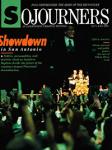After the great revival of conscience-laden rock events in 1985, it might seem today that the search for good times and the common good must again be carried out at the margins. The perception is not entirely accurate. Another star-studded Amnesty International tour is in the works, and a rockers' birthday tribute to Nelson Mandela took place in London's Wembley Stadium about the time this magazine hit the P.O. boxes. But the man-bites-dog novelty of such events has dissipated, and social consciousness has been integrated into the other concerns of pop music--i.e., love, dancing, commerce, and myth-making.
After the "Born in the U.S.A." tour's grand invocation of rock and roll as egalitarian community, Bruce Springsteen has pulled back to focus on the no-less-important business of building a marriage. On the Tunnel of Love album and in his current concert tour, Springsteen calls upon the same values of honesty, mutuality, and equality that fueled the sweeping populist gestures of his '84-'85 work. They are just worked out on the smaller scale of daily life.
It's a good career move. Springsteen doesn't want to be anyone's spokesperson or guru. To continue in a "political" vein, especially in another election year, might have irreparably limited his artistic scope. Besides, "The Boss" seems as humbled as any mere mortal by the promises and obligations of marriage. And humility is certainly a welcome and overdue addition to the rock vocabulary. The more danceable R & B-oriented rhythms on some of the Tunnel of Love tracks are also equally welcome additions to The Boss's '60s-fixated musical arsenal.
Even with the public realm placed down in the mix, Springsteen's concerts still leave no doubt as to which America he and his music belong. He still does "War" and the neo-Dust Bowl rocker, "Seeds," and in honor of Chernobyl he has revived his Three Mile Island-era (and as yet unrecorded) anti-nuclear tale, "Roulette." He has also made some unmistakably pointed (and too-vulgar-to-quote) on-stage comments about TV preachers in general, Pat Robertson in particular, and Reagan heir-apparent George Bush.
While Springsteen and the superstars for Amnesty work the hockey arenas and football stadiums, Billy Bragg is making his lonelier way through America's college auditoriums and medium-sized rock clubs. Bragg is by far the most explicitly political artist to emerge from Britain's great punk revolution of 1977. He's one of the only rock-and-rollers to actually venture into hands-on political organizing, putting together the Red Wedge, a musician's collective, to support the Labour Party in last year's parliamentary elections.
But unlike so many "committed" artists, Bragg, a 30-year-old working-class Londoner, is good and good for you. He's the Certs of semi-popular music, a breath mint and a candy mint--a politico and a poet. He's a protest singer and a writer of richly textured, bittersweet slice-of-life love songs. He's a neo-folkie and a class of '77 rock-and-roller.
Bragg performs solo in the time-honored boy-and-guitar fashion. But his guitar is electric, turned up to maximum, maximum distortion, and it is thrashed, not politely strummed. Overtones from the distortion fill up the sonic space in which most folkies rattle around. His hopelessly overdriven little amp provides some of the sternum-pumping urgency of a real rock-and-roll band, even as Bragg's solo status and low-key demeanor demolish all rock-band cliches.
BRAGG IS UNCALCULATING (or cocksure) enough to say, "I feel there's a direct line from Woody Guthrie, through Phil Ochs and Dylan, through the Stones and Clash, to me. And I'm not ashamed to admit it." He's also unpretentious enough to get away with such comments and talented enough to make them believable. Judging from his recent Washington concert, Bragg could have added Hank Williams and Smokey Robinson to his list of ancestors. Despite his apparently anti-American politics, it's Bragg's love for American country and soul music that saves him from drowning in political rectitude.
Bragg proclaims himself a democratic socialist of "the romantic softie tendency." His song "Levi Stubb's Tears" (from the Elektra album Talking To the Taxman About Poetry) went Top 40 in Britain and should have here. The song is almost a mini-novel, simultaneously evoking the great sorrows and small hopes of a young, working-class woman's life and the transcendent mystery that the music of The Four Tops brings to the center of her existence.
The night I saw Billy Bragg was also the night that Jesse Jackson went down in the New York primary. After playing for two hours, Bragg finished his encore with a rousing, and ironically touching, version of David Bowie's glitter-rock anthem "Rock-and-Roll Star." People were actually starting to leave when he took the stage again and announced the election results. Then he dedicated a song to those in the audience for whom Jackson represented "hope for something positive in your country." The song was Sam Cooke's posthumous civil rights anthem "A Change Is Gonna Come."
It hit the perfect benedictory note of consolation, inspiration, and appeal to the shelter of a great tradition. It also led me to expect even greater things from an artist who has already shown a rare ability to deal with The Big Issues in the hard-nosed and softhearted context of life's little (and not so little) ups and downs.
Danny Duncan Collum is a Sojourners contributing editor.

Got something to say about what you're reading? We value your feedback!
